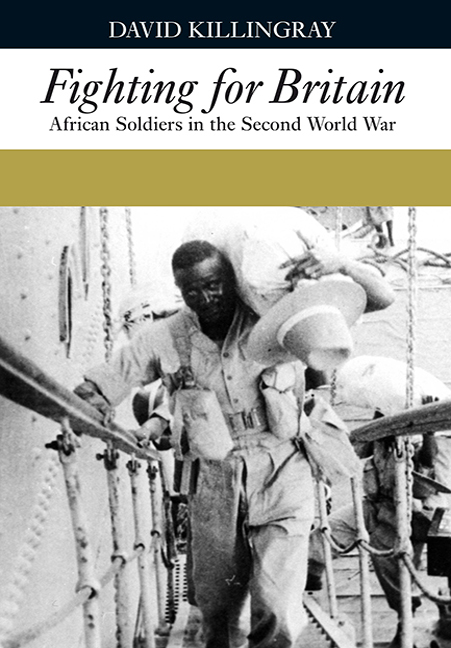
-
Select format
-
- Publisher:
- Boydell & Brewer
- Publication date:
- April 2017
- February 2010
- ISBN:
- 9781846157899
- 9781847010155
- Dimensions:
- Weight & Pages:
- Dimensions:
- Weight & Pages:
- Subjects:
- Military History, History
You may already have access via personal or institutional login- Subjects:
- Military History, History
Book description
During the Second World War over half-a-million African troops served with the British Army as combatants and non-combatants in campaigns in the Horn of Africa, the Middle East, Italy and Burma – the largest single movement of African men overseas since the slave trade. This account, based mainly on oral evidence and soldiers' letters, tells the story of the African experience of the war. It is a 'history from below' that describes how men were recruited for a war about which most knew very little. Army life exposed them to a range of new and startling experiences: new foods and forms of discipline, uniforms, machines and rifles, notions of industrial time, travel overseas, new languages and cultures, numeracy and literacy.
What impact did service in the army have on African men and their families? What new skills did soldiers acquire and to what purposes were they put on their return? What was the social impact of overseas travel, and how did the broad umbrella of army welfare services change soldiers' expectations of civilian life? And what role if any did ex-servicemen play in post-war nationalist politics? In this book African soldiers describe in their own words what it was like to undergo army training, to travel on a vast ocean, to experience battle, and their hopes and disappointments on demobilisation.
DAVID KILLINGRAY is Professor Emeritus of History, Goldsmiths, and Senior Research Fellow at the Institute of Commonwealth Studies, University of London.
Contents
Metrics
Altmetric attention score
Full text views
Full text views help Loading metrics...
Loading metrics...
* Views captured on Cambridge Core between #date#. This data will be updated every 24 hours.
Usage data cannot currently be displayed.
Accessibility standard: Unknown
Why this information is here
This section outlines the accessibility features of this content - including support for screen readers, full keyboard navigation and high-contrast display options. This may not be relevant for you.
Accessibility Information
Accessibility compliance for the PDF of this book is currently unknown and may be updated in the future.

